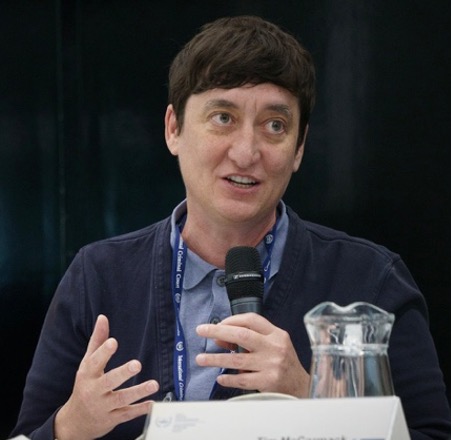Davis’s expertise informs unprecedented warrants targeting systematic persecution of women, girls, and LGBTQI+ persons in Afghanistan
On January 23, 2025, the International Criminal Court (ICC) announced two groundbreaking arrest warrant applications targeting Taliban leadership for crimes against humanity through gender persecution.

Lisa Davis, Senior Associate Dean of Clinical Programs
Lisa Davis, Senior Associate Dean of Clinical Programs and an international expert on discriminatory crimes in conflict, joined ICC Prosecutor Karim A. A. Khan in announcing historic warrants against Taliban Supreme Leader Haibatullah Akhundzada and Chief Justice Abdul Hakim Haqqani.
“This moment elevates violence against LGBTQI+ people to its rightful place as one of the gravest crimes against humanity,” said Davis.
Davis, who has testified before U.S. Congress, U.K. Parliament, and various international human rights bodies, was appointed Special Adviser on Gender Persecution to the ICC Prosecutor from 2021-2023, reflecting the Court’s heightened commitment to addressing systematic gender-based crimes. In 2024, Davis was appointed the ICC Special Adviser on Gender and Other Discriminatory Crimes
The warrants mark the first time the ICC has pursued cases specifically recognizing persecution of LGBTQI+ persons alongside the systematic oppression of women and girls—work that builds on Professor Davis’s pioneering scholarship and advocacy. Their expertise in international human rights and criminal law includes authoring groundbreaking legal arguments in cases like Karen Atala and Daughters v. Chile, which established explicit prohibitions against discrimination based on sexual orientation and gender identity in international law.
“These historic warrant applications represent a transformative moment in international criminal law, establishing that systematic gender persecution constitutes crimes against humanity,” notes the ICC Prosecutor’s office, reflecting the analytical framework Davis has helped advance as Special Adviser.
Drawing on their extensive scholarship and clinical work, Davis outlines how gender persecution manifests through interconnected deprivations of fundamental rights. These warrants lay the groundwork for prosecutors to bring criminal charges for the infringement of such rights, including freedom of expression, freedom of movement, and the right to education—human rights violations rarely prosecuted by tribunals.
As outlined by the Gender Persecution Observatory, a research hub providing real-time information about gender persecution of which Davis is the chair, “the next step for these warrants is for the ICC judges to confirm there is enough evidence to support them. If they sign off on the warrants, states will be obligated to enforce them. While several obstacles will remain to arresting the accused, the warrants will impede normalizing relations with the Taliban, which many world powers—including the US—are increasingly moving to do.”
